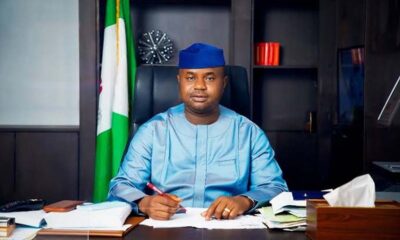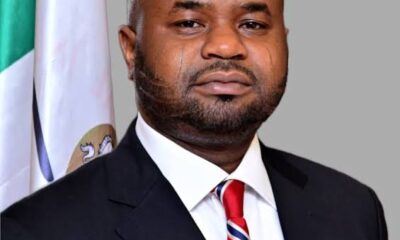News
FIRS seeks law to introduce road tax
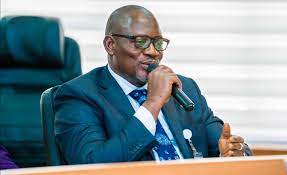
Mohammed Nami, executive chairman of the Federal Inland Revenue Service (FIRS), says a proposal has been sent to the federal government for a law on road tax.
Nami said this on Wednesday at an interactive session organised by the house of representatives committee on finance on the 2022-2024 medium term expenditure framework/fiscal strategy paper (MTEF/FSP) for ministries, departments and agencies (MDAs) in Abuja.
This is coming days after the federal government approved a new policy for tollgates across the country.
At the public hearing on Wednesday, Afolabi Olalekan, a member of the committee from Osun state, asked Nami to explain what FIRS has put in place to tackle tax evasion by people in the informal sector.
“What is your agency doing to extend your tax drive to the informal sector. Because I believe the informal sector is a veritable area where we can get a lot of money, especially this period that the county is relying on borrowing to finance budget deficit,” he asked.
Responding, Nami said FIRS is working on several measures to ensure that the informal sector pay taxes to the federal government.
He said one of the measures include the introduction of road tax.
Nami said when FIRS and the federal government finalises the framework on road tax, the proposed legislation would be sent to the national assembly.
“What we have done on the informal sector at a time was try to propose what we call a presumptive tax to the national assembly, but in the course of doing that we face a bit of challenge and we did not submit the proposal yet, simply because we discover that there is an act of the national assembly that exempted businesses with a turnover of about N1 to N25 million,” he said.
“So if you already have that, you can find it difficult to say come and pay presumptive tax. Presumptive tax is a tax that we just give you form to say based on your own estimate, how much have you generated this year and you say 12 million, then we say pay maybe six percent of that 12 million and you go because you are not an organised sector.
“But there is a law which has exempted every business with a turnover of N1 and N25 million so you find it difficult to implement such a thing.
“The second thing we are doing of which we have already done is to create a department called intelligence, strategic data-mining and analysis department; which the only thing these young boys and girls do on a daily basis is just to gather intelligence on companies and particularly these informal sector, analyse them and then escalate those gap that they identify for the purpose of tax assessment and tax collection.
“Number three thing we are thinking of, and we will surely come back to the national assembly on that, is to introduce road taxes. Road tax is necessary because all over the world there is no way we would see people that will use roads for free.
“As is it today, even if you are able to give an entire N10 trillion to the Federal Republic of Nigeria, it will not be able to fix the roads in Nigeria, just the roads in Nigeria alone.
“So what we have decided to do is to propose the introduction of road taxes to the federal government through our special tax operations department so that at least 50 trucks that would be plying these roads for free at any given point in time, comes across a toll gate or probably somewhere that we are going to use electronic device to collect it without necessarily erecting toll gate.
“We are aware that the owners of these trucks, they don’t pay anything to the government, they don’t get the FIRS certificate. So up to 15 or 20 trucks that will ply the road that is built with personal income tax that I pay and you pay and then they don’t pay taxes. That is what we want to identify.”
News
Ondo: INEC new challenge as 1.7 million votes decide next gov today
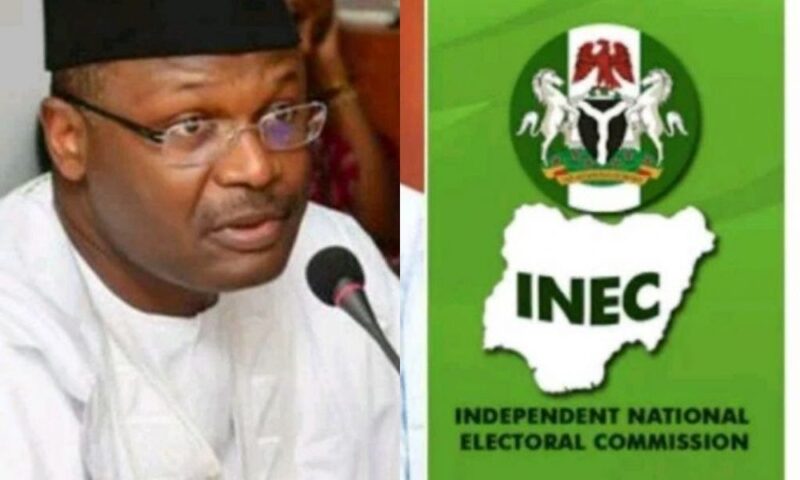
Ondo: INEC new challenge as 1.7 million votes decide next gov today
Today, 1,757,205 registered voters in Ondo State will head to polling stations across its 18 local government areas to elect a new governor who will steer the affairs of the state for the next four years.
This marks an increase in the number of registered voters compared to the 2020 election, which had 1,647,973 registered voters, of which only 580,887 votes were recorded.
The Independent National Electoral Commission (INEC) has expressed its readiness for the exercise, deploying 4,002 Bimodal Voter Accreditation System (BVAS) devices across 3,933 polling units, with 812 units on standby in case of technical hitches.
Speaking on the commission’s preparations, the Resident Electoral Commissioner (REC), Mrs Oluwatoyin Babalola, assured the public that sensitive materials were distributed on Thursday to the Registration Area Centres (RACs) for timely deployment.
READ ALSO:
- Ondo poll: Three gov candidates withdraw for Aiyedatiwa
- $6bn fraud: Judge scolds Agunloye’s counsel over delay tactics
- Emefiele printed new naira notes different from what Buhari approved – Ex-CBN official
Tinubu calls for peaceful polls
President Bola Ahmed Tinubu has called on stakeholders and voters to uphold peace during and after the election. Through his Special Adviser on Information and Strategy, Bayo Onanuga, Tinubu emphasised the importance of the election reflecting the people’s will.
“The president reminds all political stakeholders, especially the candidates, that governance is a privilege bestowed by the people. This privilege must be respected, and Nigerians deserve a free and fair election to consolidate our democracy,” the statement read.
Tinubu also commended the security agencies’ preparedness, with the Inspector-General of Police and the Chief of Defence Staff, assuring professionalism during the exercise.
Ondo: INEC new challenge as 1.7 million votes decide next gov today
News
Late COAS Lagbaja gets CFR honour, buried amid tributes
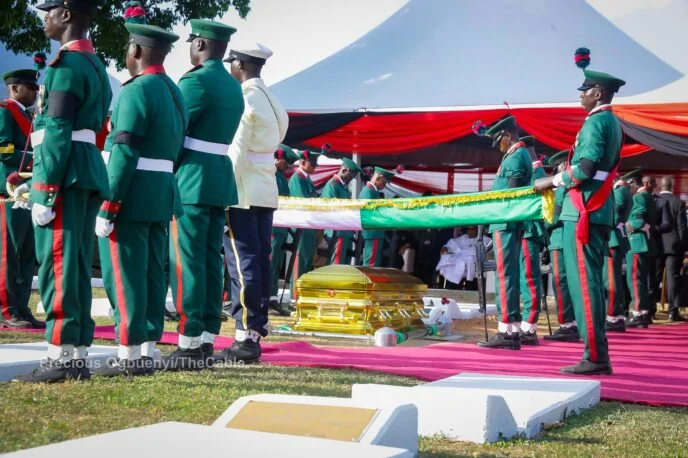
Late COAS Lagbaja gets CFR honour, buried amid tributes
The late Chief of Army Staff (COAS), Lt. General Taoreed Lagbaja, was on Friday laid to rest in Abuja, amid tears and tributes.
President Bola Tinubu conferred a posthumous award of the Commander of the Federal Republic (CFR) on the late Chief of Army Staff.
The burial took place at the National Cemetery in Abuja to end two days of funeral rites that began in Lagos earlier in the week.
His body was lowered into the grave at exactly 4:41pm after the ceremony that lasted over two hours.
Lagbaja’s casket, draped in Nigeria’s green and white colours, arrived at the cemetery around 3pm in a white funeral wagon after a funeral service at the National Christian Centre in Abuja.
Dignitaries were led to the event by President Bola Tinubu. Others are Vice President Kashim Shettima; the Acting Chief of Army Staff, Lt.Gen. Olufemi Oluyede; the Chief of Defence Staff, Gen. Christopher Musa; Minister of Defence, Abubakar Badaru, and other top government officials and military brass.
President Tinubu announced the conferment of the CFR on the late COAS during the interment at the National Cemetery in Abuja.
The President extolled the virtues of the late warrior, especially his contributions to national security.
According to him, the appointment of Lagbaja as the COAS was one of his finest made so far.
“As an eternal symbol of our appreciation, I have granted the late Chief of Army Staff, the posthumous national honour of the Commander of the Federal Republic of the Niger (CFR),” Tinubu declared.
He thereafter invited the wife of the late COAS, Mariya, to collect the award on behalf of the Lagbaja family amid applause from the congregation.
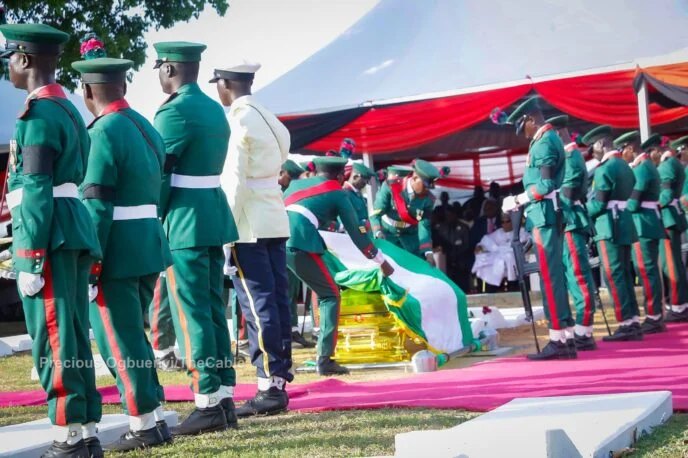
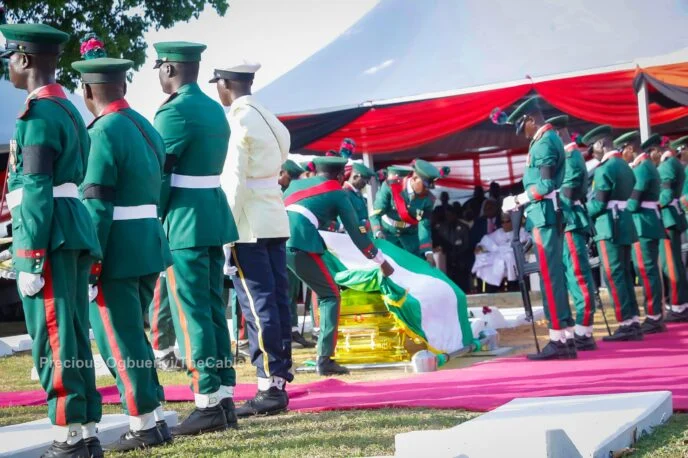
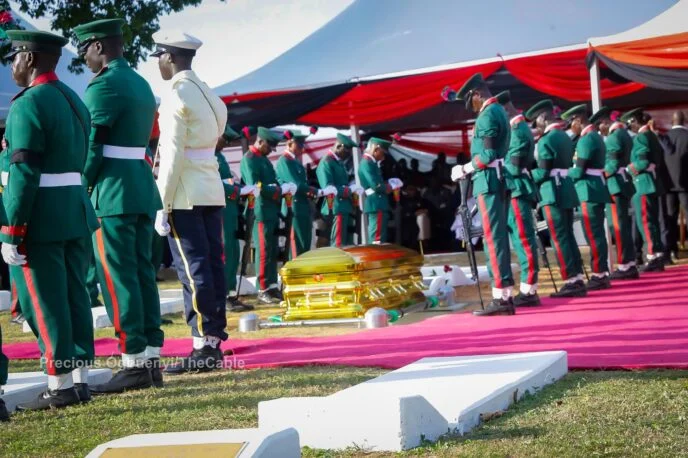
News
Supreme Court dismisses 16 govs suit challenging EFCC legality

Supreme Court dismisses 16 govs suit challenging EFCC legality
The Supreme Court has dismissed the suit by 16 states challenging the constitutionality of the acts establishing the Economic and Financial Crimes Commission and two others.
The News Agency of Nigeria (NAN) reports that the other agencies are the Independent Corrupt Practices and other related offences Commission (ICPC) and the Nigerian Financial Intelligence Unit (NFIU).
In the lead judgment by Justice Uwani Abba-Aji delivered on Friday, the Supreme Court resolved the six issues raised for determination in the suit against the plaintiffs.
The court held that the laws establishing the anti-corruption agencies were validly enacted by the National Assembly within its legislative competence.
It faulted the claim by the plaintiffs that the EFCC Act, being a product of the United Nations convention on corruption, ought to be ratified by majority of the state houses of assembly.
Delivering judgement on Friday, Justice Abba-Aji ruled that “the EFCC Act, which was not established from a treaty but a convention, does not need the ratification of the houses of assembly.”
-

 Sports2 days ago
Sports2 days agoBREAKING: Super Eagles qualify for AFCON 2025
-

 Aviation2 days ago
Aviation2 days agoDisaster averted as bird strike hits Abuja-Lagos Air Peace flight
-

 metro24 hours ago
metro24 hours agoCourt orders varsity to pay lecturer N40m compensation for wrongful dismissal
-

 Opinion23 hours ago
Opinion23 hours agoApomu king turns warmonger for PDP
-

 Education3 days ago
Education3 days ago12-year-old Nigerian girl Eniola Shokunbi invents air filter to reduce spread of diseases in US schools
-
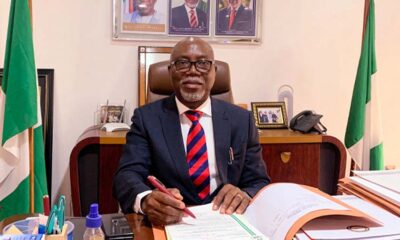
 Politics23 hours ago
Politics23 hours agoOndo poll: Three gov candidates withdraw for Aiyedatiwa
-
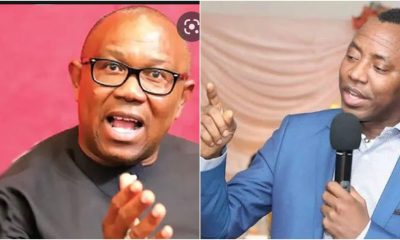
 Politics3 days ago
Politics3 days agoWhy I can’t form coalition with Peter Obi – Sowore
-
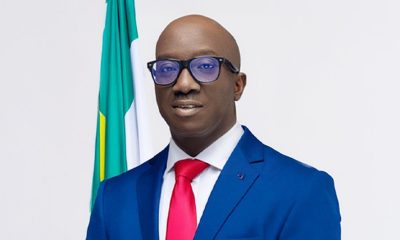
 News2 days ago
News2 days agoEdo Gov Okpebholo freezes govt accounts, reverses ministry’s name





